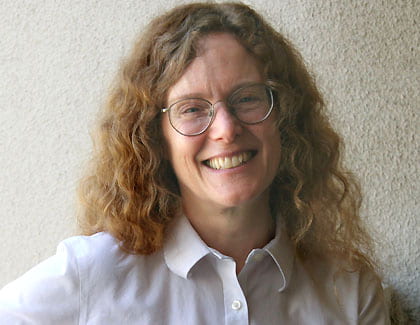The thinker
Chancellor’s Professor Penelope Maddy has made a name for herself by examining math’s mysteries

As a child, Penelope Maddy didn’t care much for arithmetic – doing sums had little appeal. Everything changed, however, when she took her first algebra class in junior high and began tackling the kind of word problems most students dread.
“I found it stunning. You could set up an equation and solve a problem,” she says.
Today, the girl who was once by bored by arithmetic has become a leading philosopher of mathematics. Maddy, Chancellor’s Professor of Logic & Philosophy of Science and of Mathematics, is renowned in the rarefied world of math philosophers – though few outside academia know her or understand her work.
“What I’m asking is, ‘What makes 2 plus 2 equal 4?’” she says. “‘Is it something about our physical world? Is it something about some abstract world of things like 2 and 4? Is it the way we think? Is it our language? Is it something we all got together and decided? What makes math true?’
“We might think it’s true because our first grade teacher told us, but that’s not what makes it true.”
That’s the simple, 30-second summation of Maddy’s work, the explanation she gives when asked what she does at cocktail parties.
“It usually stops the conversation,” she jokes.
To understand her research properly, one would have to read her numerous papers and books, including the award-winningNaturalism in Mathematics. Simply put, Maddy examines what justifies the most basic assumptions of mathematics.
“These assumptions can’t be proved, because they’re the basis from which all proofs begin, but if they aren’t proved, what kinds of considerations can legitimately count for or against them?” she asks. “If we could better understand what supports our current assumptions, we might be able to find legitimate new assumptions, and these in turn might help us answer various natural questions that we know can’t be answered from what we’re assuming now.”
Those who understand the significance of her research have recognized her contributions. Maddy is a member of the American Academy of Arts and Sciences and president of the international Association of Symbolic Logic.
She got a bachelor’s in mathematics from UC Berkeley in 1972 and doctorate in philosophy from Princeton University in 1978. She taught at the University of Notre Dame and at the University of Illinois, Chicago before joining UCI in 1987. She was founding chair of the Department of Logic and Philosophy of Science, which was recently ranked No. 1 in philosophies of science and math by the Philosophical Gourmet Report.
“I feel proud of this department,” she says. “We had a picture of how this sort of philosophy ought to be done, and we managed to build a department that reflects it. It’s gratifying to have that recognized.”
